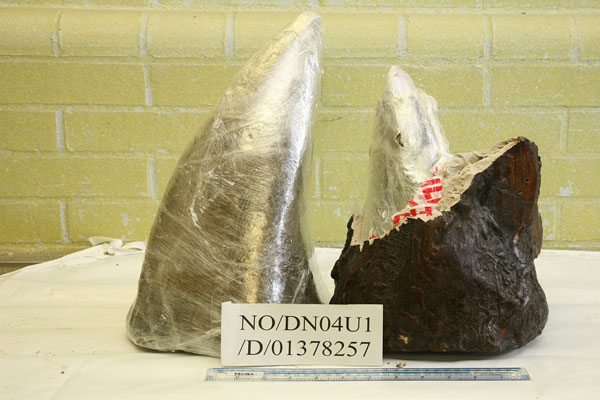
August 26, 2017; Times Live, Voice of America, and CNN
They are images that no one wants to see: Photos of endangered rhinoceroses rotting in the hot African sun, senselessly slaughtered for their horns. It’s a nightmare scenario that John Hume pays thousands of dollars each month to thwart. He owns the largest private rhino collection, 1,535 at the last count, in the world. He spends $170,000 a month just to secure his heard from poachers. He also takes the additional precaution of removing the rhinos’ horns by tranquilizing the rhinos and painlessly trimming them—unlike poachers, who kill the animals. (The horns are made of keratin, the same protein in human fingernails.)
For Hume and other rhino breeders, the cost of protecting the animals has made owning them for breeding stock unsustainable. As a result, Hume has proposed that he should be allowed to sell the horns, which were humanely obtained, to continue to protect the rhinos in his care.
“If I don’t sell rhino horn,” Hume told media outlets in August, “in 10 years’ time, my 1,535 rhinos out there are all going to be dead.”
In his quest, Hume has battled for years to overturn a ban on the sale of horn in South Africa. International trade of rhino horns had been banned for forty years. In August, the High Court in Pretoria paved the way for his controversial auction, but Hume hit a roadblock when it came to obtaining a permit. Eventually, the minister of environmental affairs was ordered to hand over a permit for the sale of 264 rhino horns, though Hume feels the delay dampened the turnout for the auction.
The three-day online auction was the first of its kind since South Africa banned the domestic trade in rhino horn in 2009. Since the ban, those seeking the horns have relied upon an illegal network of poachers, smugglers, and traffickers to meet the demand. Hume feels that flooding the market with his legal horns would reduce the demand for poachers.
Sign up for our free newsletters
Subscribe to NPQ's newsletters to have our top stories delivered directly to your inbox.
By signing up, you agree to our privacy policy and terms of use, and to receive messages from NPQ and our partners.
According to CNN, environmental groups said there is no conservation value in the auction and that is a dangerous mistake to view rhinos as livestock. “The focus of conservation should be on wild rhinos,” says Christina Pretorius of the International Fund for Animal Welfare (IFAW). “Rhinos can’t produce enough horn on a regular basis to stem the insatiable demand.”
The World Wildlife Fund (WWF) estimates the number of rhinos poached in South Africa has increased by 9,000 percent, rising from 13 in 2007 to 2014’s record level of 1,215. Rhino horns can fetch up to $100,000 per kilo in illegal black markets, most notably in Vietnam, where they are believed to have medicinal benefits, as well as being considered a status symbol. WWF has been engaged in using modern technology to “chip” rhinos in the wild, enabling conservationists to track them. The chips will also aid in the prosecution of poachers, should they be killed and their horns harvested.
Hidden in their horns, the minute chips allow researchers to individually identify Kenya’s endangered rhinos and monitor each animal. And if poachers do strike, those tiny bits of technology could ensure that they—and others along the trafficking chain—pay for their crimes.
While the chipping efforts could aid in prosecution of those involved in the illegal trade and poaching, the rhinos would still pay with their lives, which is an unacceptable trade.
Hume is keeping the identity of the bidders and the prices paid for the horns confidential for now. A condition of the auction requires buyers to plunk down a $7,000 deposit to participate in the online auction, and winners must agree that the horn will remain in South Africa after purchase. However, those in opposition to the auction are quick to point out that there aren’t enough law enforcement officials to ensure the horns don’t end up on the black market, where the hyperbole has caused prices and poaching to skyrocket.—Carrie Collins-Fadell













